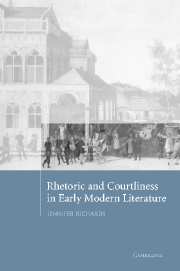Book contents
- Frontmatter
- Contents
- Acknowledgements
- Introduction
- 1 Types of honesty: civil and domestical conversation
- 2 From rhetoric to conversation: reading for Cicero in The Book of the Courtier
- 3 Honest rivalries: Tudor humanism and linguistic and social reform
- 4 Honest speakers: sociable commerce and civil conversation
- 5 A commonwealth of letters: Harvey and Spenser in dialogue
- 6 A new poet, a new social economy: homosociality in The Shepheardes Calender
- Conclusion
- Notes
- Bibliography
- Index
2 - From rhetoric to conversation: reading for Cicero in The Book of the Courtier
Published online by Cambridge University Press: 22 September 2009
- Frontmatter
- Contents
- Acknowledgements
- Introduction
- 1 Types of honesty: civil and domestical conversation
- 2 From rhetoric to conversation: reading for Cicero in The Book of the Courtier
- 3 Honest rivalries: Tudor humanism and linguistic and social reform
- 4 Honest speakers: sociable commerce and civil conversation
- 5 A commonwealth of letters: Harvey and Spenser in dialogue
- 6 A new poet, a new social economy: homosociality in The Shepheardes Calender
- Conclusion
- Notes
- Bibliography
- Index
Summary
Baldassare Castiglione's Il libro del cortegiano (1528) – The Book of the Courtier – is one of the most influential texts in Renaissance European culture. The book is a reported dialogue which supposedly took place in the palace of Urbino several decades prior to its recording, and it is permeated throughout by the nostalgia of its narrator, Castiglione, who is attempting to capture an idyllic moment in the life of that court. The dialogue takes place over four nights (each night is reported in one of its four books), and despite its seemingly serious topic – the definition of the ideal courtier – it has the spirit of a party game.
The importance of this book in late Renaissance Italian culture is well understood. Most often, it seems to signal the cultural bias towards the despotic court identified as a mark of late Italian humanism. ‘If early humanism was a glorification of civic life’, writes Eugenio Garin, then ‘the last part of the fifteenth century was characterized by an orientation towards contemplation and an escape from the world’. Garin sees this as a development of an ascetic Platonism in the late fifteenth century which is ‘determined by the pressure of the political development of Italy’, specifically, the rise of princely power and the decline of the republican city-states. The republican citizen is superseded by the courtier, an individual ‘whom it is impossible to imagine capable of clear political thinking’.
- Type
- Chapter
- Information
- Rhetoric and Courtliness in Early Modern Literature , pp. 43 - 64Publisher: Cambridge University PressPrint publication year: 2003
- 2
- Cited by

